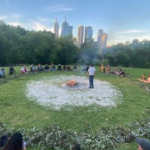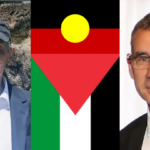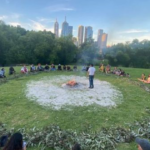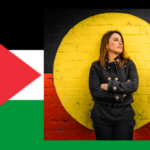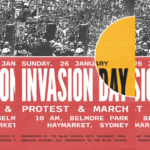Victoria Refuses to Prosecute King Charles for Genocide: Interview with Uncle Robbie Thorpe
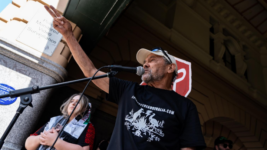
Victorian Supreme Court Justice Melinda Richards recently issued her ruling on a judicial review of a Magistrates Court of Victoria December 2023 decision not to issue proceedings in respect of an attempted private prosecution against king Charles III by Krauatungalung elder Uncle Robbie Thorpe for the international crime of genocide against the First Peoples of Victoria.
The hearing relating to Richard’s 5 February 2025 findings, took place on 19 July last year, and it involved Thorpe presenting his case to the court for two hours straight, which saw him enter details on to the official record that involve the brutal dispossession and genociding against the First Peoples of the region now referred to as the state of Victoria that continues to this day.
Proceedings weren’t issued against the charge sheet in respect of Charles Philip Arthur George Windsor because Uncle Robbie raised the charge of genocide against him in relation to three tiers of law – First Peoples’ sovereign law, the common law of Victoria and division 268 of the Criminal Code Act 1995 (Cth) – instead of specifying one genocide charge under one law.
Yet, one only has to speak to Thorpe to understand that although the court has denied his proceedings, the outcome was not only to be expected, but ultimately, the judgement that Richards has provided is so thorough an explanation as to why the crime of genocide can’t be prosecuted in Australia, that it has paved the way to take the matter to the International Criminal Court (ICC).
Prosecuting genocide denied
Uncle Robbie has been running genocide prosecutions since the 1990s. Richards raised two cases he had been a part of, the 1999 Federal Court case Nulyarimma versus Thompson and the 1999 Victorian Supreme Court case Thorpe versus Kennett, that sought to invoke genocide under the 1948 Convention on the Prevention and Punishment of Genocide, which this nation ratified in 1949.
In line with the findings of the 1990s cases, Richards found that due to the convention never being enacted into statutory law and the offence of genocide not having been incorporated into common law, the charge sheet couldn’t be issued under Victorian common law, and further the laws governing the Victorian Magistrates Court, will not allow it to consider First Peoples’ sovereign law.
But the game has changed since the 1990s, as the Rome Statute came into force internationally in 2002, and it created the ICC. And as this nation had ratified the statute, the Australian government was then required to enact the international crimes of genocide, war crimes and crimes against humanity into local law, where they now sit under division 268 of the Criminal Code Act 1995 (Cth).
When enacting these offences into Australian domestic law, however, the Howard government too created the attorney general’s fiat, which means that the nation’s chief lawmaker has to sign off on a genocide prosecution before its progressed. And as Richards found, this means that the proceedings against so-called king Charles III could not be issued, as AG Mark Dreyfus had not greenlighted it.
Sydney Criminal Lawyers spoke to Krauatungalung elder Uncle Robbie Thorpe about the findings of the court, and how the denial to issue proceedings against Charles Windsor, coupled with Justice Richards’ 5 February 2025 findings, actually clear the path to take the matter of Australian genocide to the higher authority of the international court.
Uncle Robbie, all of the genocide cases you’ve run since the mid-90s have succeeded in entering information on the dispossession and genocide against the First Peoples of this continent onto the official court record, and they’ve too caused the courts to acknowledge certain truths that had been refused in the past.
So, how do you consider the 5 February 2025 findings of Justice Melinda Richards relating to your attempt to launch a genocide prosecution against so-called king Charles III? What sort of gains have been made?
Every time we mention genocide in the courts in this country it goes some way to creating a pathway to where we really want to go at the end of the day and that’s to the International Criminal Court. We know we are never going to get justice in this country.
We are exposing the unwillingness, the reluctance and the inability to deal on the international legal level – that’s exhausting the domestic remedy. Every action goes towards that.
With the courts in this country, we have to think long term in how we deal with them.
It’s been quite a while since we ran our first genocide case. At that time, people were very reluctant to use that word. It was a big no-no, the word genocide.
We have come a long way since then and it is all having some sort of impact now. The word is part of the vernacular these days.
So, you’re talking from the mid-1990s until now?
Yes, that is what it has taken us. It has almost been 30 years since we first ran these cases. We as Aboriginal people know it is very clear-cut. It was intentional genocide in this country from the get-go.
Nothing has changed. They are still doing it: the forced removal of children, the killing of our people in custody, deliberately inflicting conditions of life with intent to destroy and destroying the culture.
In fact, everything you find is genocide, according to the 1948 Genocide Convention. And we need to get that into the International Criminal Court and get some justice for our people.
Every tribal nation across this continent has got the same issue, and we are creating a platform for our people.
We are doing the hard yards here. We are not funded. It’s not like we are a government funded organisation, like the legal service. We are doing this outside of all of that.
We could never get funding. So, we have to do it independently. That is why it has taken time as well. But now it is starting to gather momentum, and I’m pretty sure things are going to change, even this year.
In terms of the charge sheet against the so-called king, you attempted to charge Charles with genocide under three sets of law: First Peoples’ sovereign law, the common law of Victoria and division 268 of the Criminal Code Act 1995 (Cth).
But Justice Richards found the case could not be run under any of these laws.
What would you say the implications of this outcome are?
The United Nations Genocide Convention has got universal jurisdiction regardless of what the colonial courts in this country say, and if they can’t deal with them, it naturally goes to the prosecutors at the international court.
This has tested the will of the state. We knew they were not going to rule in our favour, because it’s basically committing suicide for them if they do.
This is clearing the decks of all the blocks they have, like finding that they’ve got no jurisdiction, genocide has universal jurisdiction if they understand the convention.
But what is different now is that Australia has signed onto the International Criminal Court and genocide is a crime. So, are they part of that court or what?
The noose is tightening around their neck. We’ve now done some of the leg work to make it easier for us to argue our cases down the track, thinking long-term.
We are not going anywhere. We want these matters dealt with sooner or later. This isn’t a nation: it’s an illegal criminal occupation, perpetrating genocide and ecocide and stealing resources.
We want some justice for our people. We want it now. As I said, they are guilty of everything that makes up genocide, according to international law.
To some people, the attempt to charge so-called king Charles III with genocide doesn’t quite make sense.
Can you explain how Charles Windsor is engaged in the act of genocide in regard to the First Peoples of this continent?
Well, can you explain to me how come he is the head of state here. He is a foreigner. The British Crown – what has that go to do with Australia?
But his family does have a lot to do with it. In fact, they actually control this country. If you look at every piece of law that had ever been made in this country, it requires royal assent to make it law.
Does the British Crown, does the royal family, benefit from the criminal genocide of our people in this country? Are they beneficiaries?
There are many ways that they are responsible and complicit in it all. In fact, they are fundamental to the whole process of genocide here.
Captain Cook was killed on this day by the Hawaiians. Do you know who Captain Cook was? He was given specific instructions to get consent from Aboriginal people, but he never did.
Cook claimed it was empty land. That is how it played out. We all know what terra nullius means. It is actually an act of premeditated genocide. That’s one act. And that is to do with the British Crown.
Cook had specific instructions: get consent. People understand what the meaning of the word consent is. I am sure a lot of women do. Is it important to them? Well, consent is important to our people too.
So, that’s the involvement of the British Crown.
You raise the laws being passed now needing royal assent. Would you say laws being passed now by Australian parliaments are continuing genocide against First Peoples?
Absolutely. Have a look. Look at the rate of deaths in custody.
We are talking about the issue of jurisdiction. Do the colonisers have jurisdiction here? That’s an issue. How come we are filling their gaols? How come we are dying at the hands of their police and in their gaols?
According to the Convention, killing members of the group is an act of genocide. And if you look at article 2 of the Genocide Convention, it includes the forced removal of Aboriginal people from one group to the other.
Is that occurring? Yes, it is.
Are they creating conditions of life with intent to destroy our people? I’d say yes, very much so. They control our welfare and every aspect of our lives – very, very badly.
In fact, everything that makes up genocide Australia is guilty of, there is no doubt about that.
We need to go to the International Criminal Court. Australia is in a deep state of denial. They are racist in the extreme. And they are basically ignorant about the true history here.
It is a continuing act of genocide, until they get consent, until they get treaties.
Was there a war in this country? When did it begin, and when did it end?
These are all issues relevant to genocide, as far as I am concerned.
The Richards findings saw the Victorian Supreme Court acknowledge Aboriginal sovereignty for the first time, however they too stated the court has no authority to prosecute genocide, and it has knocked backed all other genocide prosecutions you have brought before it.
So, what do you plan to do from here? Is it time to go to the international court?
Yes, it is time to go there. We have people looking at the recent Supreme Court ruling of Justice Melinda Richards and some of the things that she said in her judgement were very interesting, including issues of race discrimination.
Every time they judge on this, they fall deeper into the abyss, and sooner or later, they are going to have to deal with this.
They are out of sight, out of mind, Australia. They are getting away with murder.
So, we are going to bring them into the fold, and expose the true history of this country, that people don’t know about.
When you take it to the International Criminal Court will you focus on one case, or will it be a range?
We have a clear-cut case in Victoria. It is up to other mobs if they want to do it. Even individuals have got a right to be free from the act of genocide, so anyone can do this.
We are clearing a path for all the other mobs to join in on this. It doesn’t matter who does it, at the end of the day, as long as it gets done.
You want genocide to stop at the end of the day, not when the colonisers think they are ready for it. We want it done today.
We want restoration and restitution. Fix this country up the way you found it. If you can’t do that, you have to provide restitution.
We are not subject to your law, by the way. We have already got one.
So, we have to make these points, and we will continue our struggle and argument, as long as we can until we get justice.
We are not going away and the truth will win at the end of the day. We have the truth on our side here.
Everyone deserves to be free from genocide.



